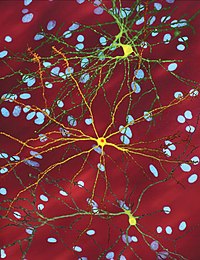
Photo from wikipedia
The increasing use of biomarker tests for Alzheimer's disease (AD) in research and, to a much lesser extent, specialty care settings has led to questions concerning how individuals may react… Click to show full abstract
The increasing use of biomarker tests for Alzheimer's disease (AD) in research and, to a much lesser extent, specialty care settings has led to questions concerning how individuals may react to learning of their AD biomarker status in the absence of a cure or preventative treatment. The purpose of this chapter is to systematically review the published evidence regarding amyloid imaging results disclosure and to synthesize findings across studies with a focus on the psychological, social, and behavioral outcomes of such results disclosure. Following the Preferred Reporting Items for Systematic Review and Meta-Analyses (PRISMA) guidelines, we searched six electronic databases, screened 265 articles, and reviewed seven publications in depth. Most studies were descriptive in nature and lack control groups. However, as a group, these articles provide important early insights into the psychological safety of disclosing amyloid imaging results to cognitively normal persons, and highlight the need for rigorously designed studies that address social and behavioral outcomes and extend to symptomatic populations.
Journal Title: Progress in molecular biology and translational science
Year Published: 2019
Link to full text (if available)
Share on Social Media: Sign Up to like & get
recommendations!